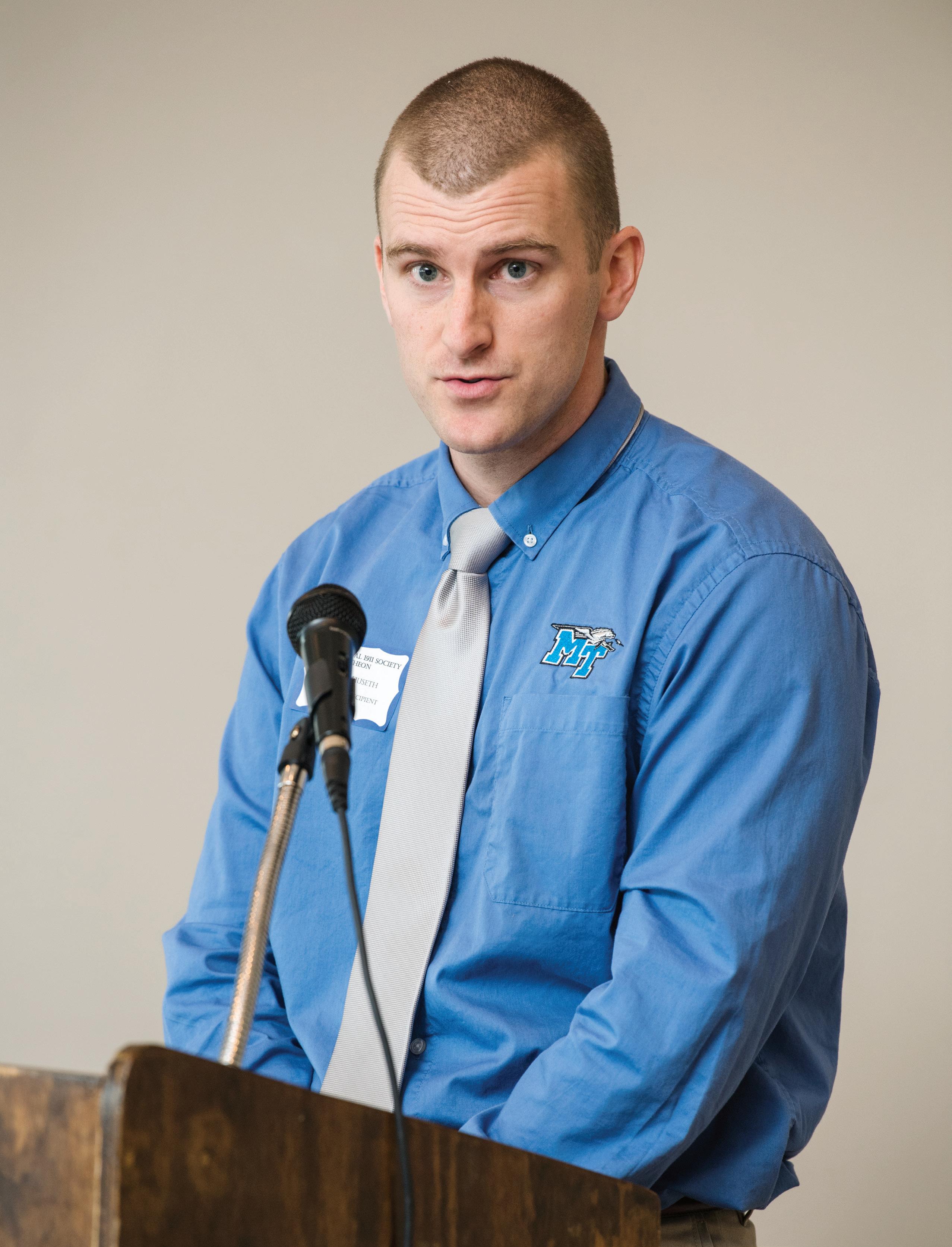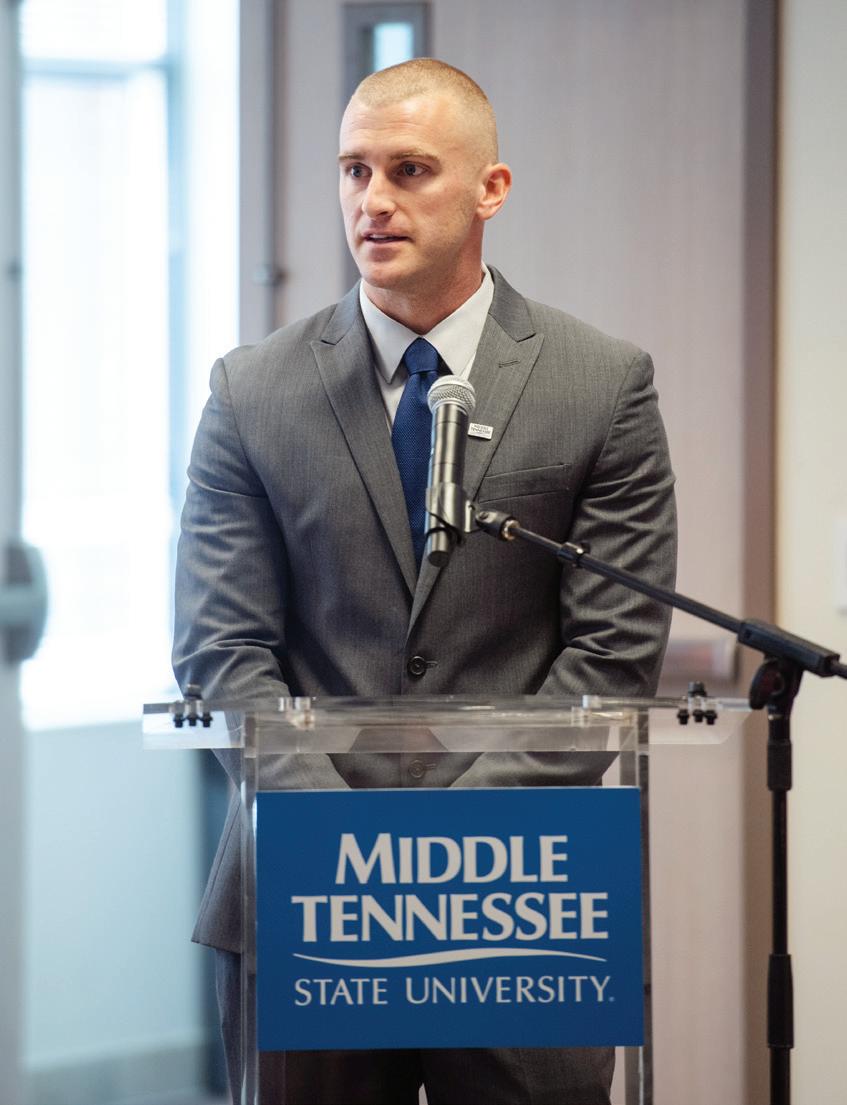
8 minute read
Finding a Home
Combat veteran and inactive Marine Sgt. Corbitt Huseth helps wounded vets while pursuing his Ph.D. by Skip Anderson
Corbitt Huseth, Afghanistan combat veteran and still a U.S. Marine sergeant (inactive), served as an explosives expert. He says events in his life have happily moved along quickly since returning stateside and enrolling at Middle Tennessee State University. But the truth is that the speed of Huseth’s life was whipcrack fast long before relocating to Murfreesboro. “I was out of the Marine Corps, and my wife Googled veteran-friendly campuses in late 2014 and I enrolled at MTSU in 2015,” Huseth said. “It turns out that MTSU is one of the friendliest campuses for student veterans in the whole country.” Huseth, who served the country as an infantryman during active duty, says MTSU’s Charlie and Hazel Daniels Veterans and Military Family Center not only bolsters the University’s national—and growing—reputation. He says the Daniels Center team, led by LTG(R) Keith M. Huber and Hilary Miller (Ed.D.), also hustles to administer services to student veterans on a speedy basis. After all, these particular students signed on to defend democracy and the interests of the United States around the globe. “What [LTG(R) Huber] has done for me through the Daniels Center has been so helpful,” Huseth said. The Daniels Center “has ensured that my work experience through five years of serving in the military transfers directly into MTSU’s system. That’s so important. Before I came to MTSU, I went to a community college, and they only gave me 8 credits for my military service—MTSU was able to give me 26 credits. It’s nice that my service was recognized like that.” In addition to myriad ways of servicing MTSU’s student veterans, such as keeping them apprised of job openings for which they’re likely to be strong candidates, the Daniels Center also links these students to financial assistance whenever possible. In Huseth’s case, that meant connecting him to a scholarship exclusively for post-9/11 veterans.
“There have been a lot of blessings along the way since coming to MTSU,” Huseth said. “The Daniels Center is outstanding at connecting veterans with opportunities. Part of what they do is make sure each individual understands the job opportunities and financial opportunities that are out there; they introduced me to the Sentinels of Freedom Foundation, an organization that helps bridge the gap between the GI Bill ® and the expenses students incur. That’s important for all veterans.
“If [the Sentinels] accept you, they will pay your mortgage and provide mentors for finances and career placements. I was awarded it. For someone like me, one with a family and a mortgage, that’s what made my education possible.”

Corbitt Huseth speaking at the Board of Trustees Fall 2019 meeting photo by James Cessna

As quickly as his life unfolded once enrolling at MTSU—earning a bachelor’s, a master’s, and likely a Ph.D. within five years—the facts show that the events in Huseth’s life were zipping along well before his return. Take, for example, the first 100 minutes that followed after he landed in the river valley of Sangin, Afghanistan. “Everything was a blur from the second we got there,” Huseth said. “I was on patrol within an hour of landing. We weren’t more than 100 meters from the patrol base we had set up. We were moving through an alleyway with 1,000-year-old mud huts on both sides of us. Forty minutes into the patrol, my sergeant got hit by an IED [improvised explosive device]—we were under fire at the same time.” Huseth says time jolted sideways in the moments that followed. “He was right in front of me when it happened, but he might as well had been 10 years ahead of me. I remember thinking, ‘Sh#%, this is going to suck,’ ” Huseth said. “It didn’t seem real for a few seconds. When the dust cleared, and I got back on my feet, I realized what happened. I moved forward.” His sergeant had stepped on 15 pounds of explosives buried by Russian troops long before. Only a fraction of the explosives detonated. “Everything was robotic,” Huseth said. “I pulled him out of the crater. His leg wasn’t looking the way it should, but it was intact. It didn’t hit me what had happened until we returned to our base.” His squad leader would eventually lose his foot and a portion of his leg. Huseth escaped serious injury in that encounter—and countless others. But one was a little stranger, if not more dangerous, than most. “I wouldn’t say I was wounded, and it wasn’t Purple Heart-worthy. What I have is a scar and an interesting bar story; I would need the MythBusters to figure out exactly what happened,” Huseth said. “I caught a ricocheted bullet in the arm. It looked like a 7.62 round.” A 7.62 round is a high-caliber bullet usually fired from a military-grade rifle such as an AK-47. “It’s not a wound that I would really call a ‘wound.’ The bullet went into the flesh of my arm, but it didn’t bleed because [the bullet] cauterized the wound,” Huseth said. “We’ve estimated that it was fired from 2,000 meters away [about 1.25 miles]. The bullet basically bounced off me, which is how we know it was likely fired from so far away.” Huseth’s nine-month deployment to Afghanistan coincided with the hottest months of the year. “I was right there for the peak, that’s for sure. I landed there as just as the temperatures were on the rise, and it started to cool just as I was leaving in late September,” he said. “I’d say the heat index was typically around 120 degrees during my deployment. It’s funny, after I left, I was shaking because it was so cold— it was only 85 degrees.” Considering the number of U.S. casualties while he was stationed in Afghanistan, the Memphis native was exceptionally lucky to return home intact. Four soldiers from Huseth’s squad of 12 were wounded—his sergeant, a machine gunner, and a minesweeper were each wounded by an IED, and another member of his squad was shot. One is a tripleamputee and another a single. A squad member also killed himself after returning stateside. All told, of the 600 to 700 people from the base who conducted maneuvers during those nine months, “we had a little over 200 casualties,” including 16 combat deaths and a staggering 36 suicides.
Graduating Veterans Stole Ceremony (l–r): MTSU President Sidney A. McPhee, Corbitt Huseth, Provost Mark Byrnes, and LTG(R) Keith M. Huber photo by Andy Heidt

After returning home in October 2014, Huseth and his wife, Brieanna, moved to Murfreesboro, where he earned a B.S. in Exercise Science from MTSU’s College of Behavioral and Health Sciences in 2017. Because he was taking graduate-level classes at the same time, Huseth then completed his M.S. in Exercise Science eight months later. He now has finished the coursework required for a Ph.D. in Human Performance at MTSU and is working on a dissertation. If that wasn’t enough to keep life moving at a blazing speed, the couple also had two children—Holli, 4, and Pate, 2½—during that same span.
While Huseth was working on his bachelor’s degree, a friend who was wrapping up his Ph.D. at the time “said I would need to start jumping onto as many undergraduate research projects as I could,” Huseth said. “I started interning at the underwater treadmill lab just for the experience, but I’ve stayed there the entirety of my time at MTSU.” MTSU’s underwater treadmill lab, under the direction of Associate Professor Sandra L. Stevens, studies people with spinal cord injuries as they work to regain mobility. “People who work in that lab just love it,” Huseth said. “Watching a person walk for the first time in 30 years over ground is a pretty big thing, and you get addicted to their success. That’s how it progressed for me.” The participants include military veterans, which surely is another enticement given that his grandfather and great uncle also both served in the armed forces. “My grandfather was a Marine, and my great-uncle was a full-bird colonel in the Army who served in Korea and Vietnam,” Huseth said. “Both were infantrymen.” One of the study participants, a Vietnam veteran whom Huseth worked with early in his tenure at the underwater treadmill lab, helped him realize his desire to work with veterans. “He had been shot once and hit by a booby trap once and had a spinal injury. Dr. Stevens put me with him three to four times per week,” Huseth said. “At the beginning of my Ph.D. work, he committed suicide. The biggest hurdle for him was not his spinal cord injury, it was his mental health. It was his combat-related PTSD [post-traumatic stress disorder]. That’s when I learned I wanted to work with veterans.” Huseth is currently working full time as a veteran service representative in the Nashville regional office of the Department of Veterans Affairs. “That’s a good place for me to start,” Huseth said. “I will then switch over to something with a research component that would allow me also to work with veterans with PTSD.” Indeed, it appears events in Huseth’s life continue to move along quickly since returning stateside and enrolling at MTSU, and his journey to make a difference as a veteran working with veterans is only just beginning.







